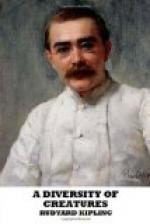‘When would you like it?’ Midmore asked. It seemed the easiest road to take.
‘Any time or other suits me, I reckon. He ain’t thrivin’ where he is, an’ I paid eighteen shillin’ for him.’ He crossed his hands on his stick and gave no further sign of life.
‘Is that all?’ Midmore stammered.
‘All now—excep’’—he glanced fretfully at the table beside him—’excep’ my usuals. Where’s that Rhoda?’
Midmore rang the bell. Rhoda came in with a bottle and a glass. The old man helped himself to four stiff fingers, rose in one piece, and stumped out. At the door he cried ferociously: ’Don’t suppose it’s any odds to you whether I’m drowned or not, but them floodgates want a wheel and winch, they do. I be too old for liftin’ ’em with the bar—my time o’ life.’
’Good riddance if ‘e was drowned,’ said Rhoda. ’But don’t you mind him. He’s only amusin’ himself. Your pore dear auntie used to give ’im ’is usual—’tisn’t the whisky you drink—an’ send ’im about ‘is business.’
‘I see. Now, is a pig-pound the same thing as a pig-sty?’
Rhoda nodded. ’’E needs one, too, but ’e ain’t entitled to it. You look at ‘is lease—third drawer on the left in that Bombay cab’net—an’ next time ’e comes you ask ’im to read it. That’ll choke ’im off, because ‘e can’t!’
There was nothing in Midmore’s past to teach him the message and significance of a hand-written lease of the late ’eighties, but Rhoda interpreted.
‘It don’t mean anything reelly,’ was her cheerful conclusion, ‘excep’ you mustn’t get rid of him anyhow, an’ ’e can do what ’e likes always. Lucky for us ’e do farm; and if it wasn’t for ‘is woman—’
‘Oh, there’s a Mrs. Sidney, is there?’
‘Lor, no!’ The Sidneys don’t marry. They keep. That’s his fourth since—to my knowledge. He was a takin’ man from the first.’
‘Any families?’
’They’d be grown up by now if there was, wouldn’t they? But you can’t spend all your days considerin’ ’is interests. That’s what gave your pore aunt ’er indigestion. ‘Ave you seen the gun-room?’
Midmore held strong views on the immorality of taking life for pleasure. But there was no denying that the late Colonel Werf’s seventy-guinea breechloaders were good at their filthy job. He loaded one, took it out and pointed—merely pointed—it at a cock-pheasant which rose out of a shrubbery behind the kitchen, and the flaming bird came down in a long slant on the lawn, stone dead. Rhoda from the scullery said it was a lovely shot, and told him lunch was ready.




